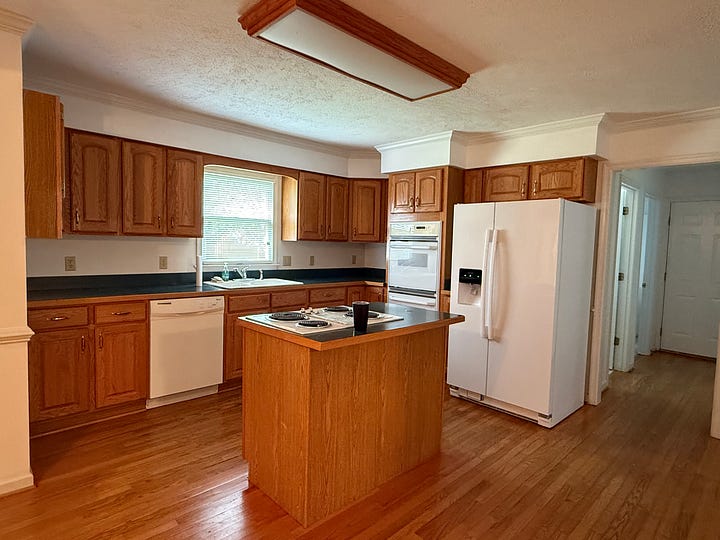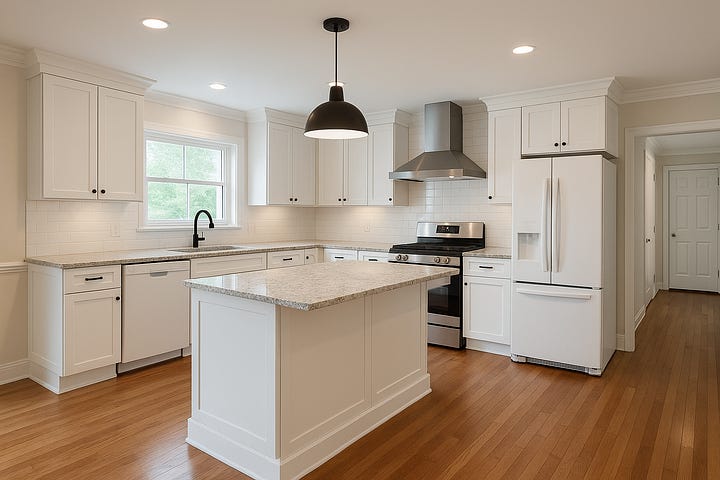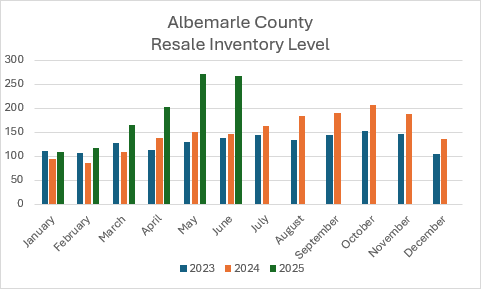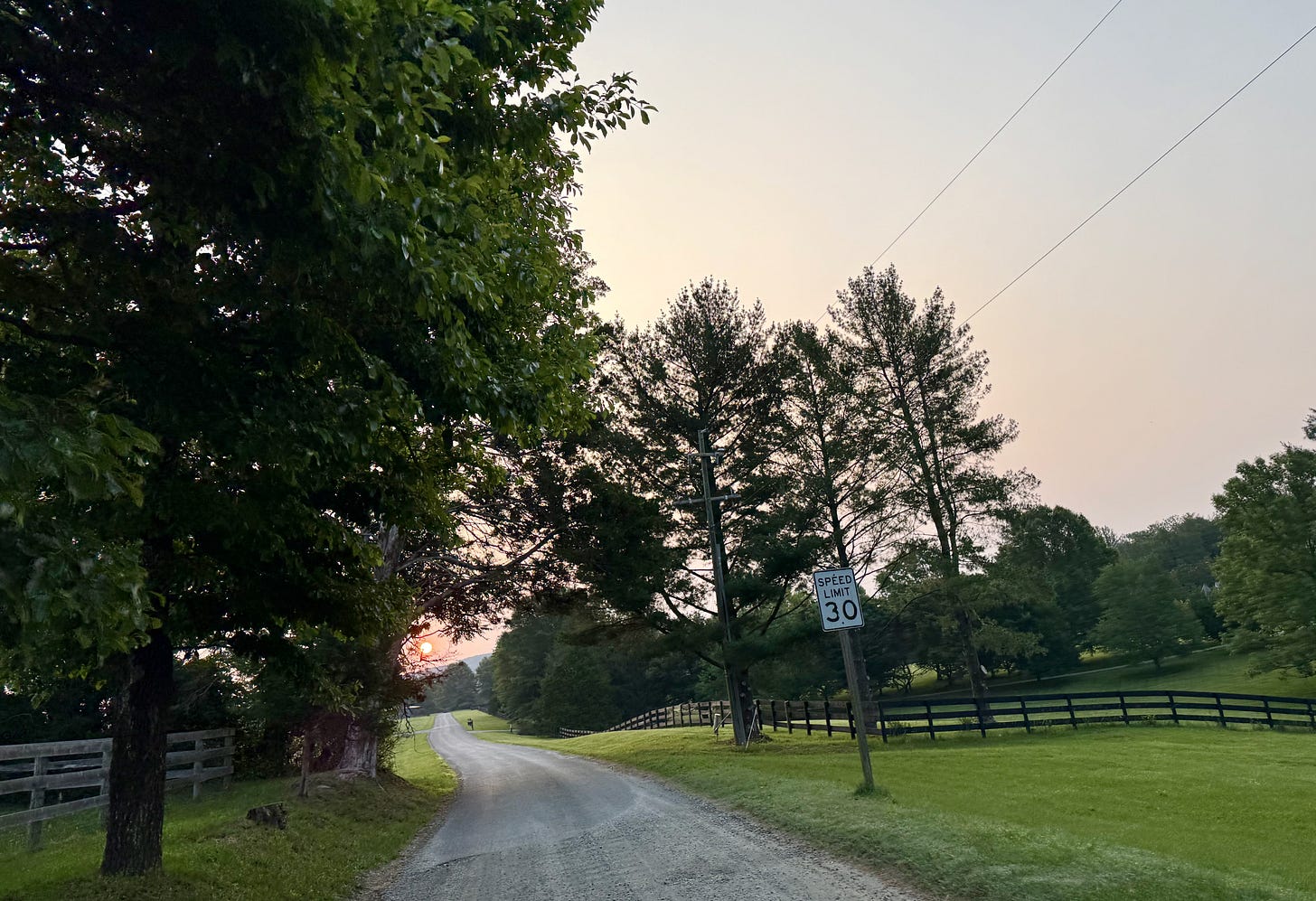Happy June, and thank you for reading!
Everything comes down to choices. Should we break something that works for selfish reasons, should we live here or there, should we sell first and rent, or try to sell at the same time? What should we do?
This month: Fracturing and fragmentation of home search, buyers making choices, home sale contingencies making a comeback, and location. Have a question? 434-242-7140
Quick Market Look
I ran out of room this month, so I wrote a market blog post instead.
But first - days on market, the best way for me to get a sense of velocity of the market.
For Charlottesville + Albemarle, all property types, just resale, removing “comp only” sales
4/1/24 - 6/14/24 - 415 went under contract. Median days on market were 5. 257 (62%) went under contract in 7 days or less.
This year, same as above - 458 went under contract. Median DOM is 9 (nearly double, for you math-inclined), and 210 (46%) went under in 7 days or less.
Buyers - you still need to know your market band well enough so that you are the one deciding whether to offer or not, and you might have more time to decide.
Sellers - price accordingly, and manage expectations.
Buyers and sellers - have questions? Please ask. 434-242-7140
The following is sort of inside-real estate politics, that absolutely affects how you (the consumer) and I (realtor/client representative) work.
The MLS works
So let’s break it?
There is a fight going on among some big brokerages, MLSs, and portals (Zillow and Homes.com notably).
Here’s my tl;dr: as the internet evolves, (big) brokerages are seeking to differentiate and build their businesses by hoarding listings, making them inaccessible to outside brokers and agents, and forcing buyers to work with X broker in order to have better perceived access to “exclusive” inventory.
This is bad.
First, from a fair housing perspective, one of the goals of the MLS, beyond cooperation between brokers and agents, is to make all housing accessible to all buyers. Segmenting and fragmenting and hoarding serves to negate this. I suspect if we still had a functioning HUD and government, they would have something to say about these new tactics.
Second, this is bad for the market. We depend on aggregated data to understand and analyze the market, and in turn guide and represent our clients. Fragmented and incomplete data is, in a word, bad. A true understanding of days on market is absolutely critical to understanding the market; hiding/manipulating this data is harmful to the market.
Third, keeping things in-house benefits the brokers hoarding the listings, and increases likelihood of single agent dual agency situations, the opposition of which is one of our founding principles at Nest.
I have represented buyers and sellers in certain situations where we have kept things in house, but never as a company-wide strategy.
Fourth, and final for now, the MLS works. We fought this battle with IDX (sharing of listings with brokers and Zillow) decades ago. And now the real estate industry is harming itself and consumers and the market by fighting this unnecessary war.
Okay, actual final point: For consumers, you and I need to work together to define what we need to analyze or find, and develop the right strategy to find all relevant data so you can make a good decision.
(some inside baseball, and relevant)
* Related: One of the chapters in Michael Lewis’ recent “Who Is Government” talks about what happens when government stops collecting the data we use. Markets need data & certainty.
Walking Away is Often the right advice
Walking away is often the right advice; so is not offering in the first place.
This is more for those in the buying phase than selling, but the concept of asking questions and guiding is applicable to both.
Sometimes when representing buyers, part of what I do is help them think about their lives, finances, timing, so that they see that the decision to not make an offer is the right decision. Or, to make an offer they’re comfortable winning or losing, even if that means having a home inspection — please get a home inspection! (story coming this year related to this)
I ask questions. I Listen. I Ask. Then leave them alone. And I make no decisions.
At the end of the day, I can’t stop my clients from making good or bad choices, but I can help them walk through and try to see the consequences —good or bad.
Yes, I make a living on contingency — I get paid only upon closing — and yes, the right advice is to not “sell” a house to a buyer client. Giving the right advice to buy, but buy the right house or at the right time is the right advice.
Home sale contingencies
Offers contingent on the sale of a house — a thing of the past — and seem to be becoming possible options again. Contingent offers aren’t going to be viable on houses that been active on the market for only a couple of days* (see above about hoarding listings) but for homes that have been on the market for a while, that seller might be more inclined to consider betting that your house is going to go under contract before theirs. (related: What’s a Kickout Clause?)
I was in a meeting at Nest this week, and the question, “Are y’all seeing home sale contingencies again?” was asked.
Several agents said they have seen and written them.
Things change. Coming back to the office makes those who choose to come back better suited to represent clients.
Short summary to buyers - don’t assume that a contingent offer is not an option. It might not be, but don’t assume.
Location, location, location
Where you live dictates how you live: how long your commute is, which coffee shop or library you frequent, which trails you walk, if you can walk or ride to school.
I have long advised my clients to focus on the “where” first. If you’ve worked with me, I have probably said to you, “We can find you a house that is perfectly fine. But if it takes you 45 minutes to get home or to work, is that the right place for you?”
Many years ago, when I was a technical recruiter, I was talking to job seekers who were commuting 2 to 4 hours each way. Each. Way. The Charlottesville market isn’t that, but there is a difference between a 10-17 minute commute and a 30-40 minute one.
The former likely connects you to one place and the latter isolates you. Both can be the right choice.
I have stories that I tell my clients, one is this (and forgive me if I’ve told you this already):
I had a client coming to Charlottesville to teach at UVA, either at Darden or the Law School. One of the key things they wanted to solve was to spend more time together as a family.
They fell in love with a house in the 29 North area — for those unfamiliar, old relocation map here for context — about a 25 minute commute.
I asked, “Will you be able to come home and have lunch with your family?”
Their shoulders softened a bit and they conceded that no, that wouldn’t be an option.
They bought a house that was about a 12-minute walk to that part of UVA, and saw a lot more of each other.
Where matters.
AI can be good.
My clients and I couldn’t quite figure out how to reimagine the brown kitchen. Uploaded the picture on the left* Claude.ai, and it responded with the kitchen on the right. We were stuck on what to do with the built-in ovens; the AI solution was quite nice.
*picture posted with the listing agent’s permission


They didn’t buy that house, but we learned a few things.
What I’m Reading
Tips for a new homeowner in Charlottesville. I wrote this a few years ago, forgot about it, and found it when searching for something else. Still relevant.
Insurance
How to talk with buyers about homeowners insurance - I’ve been doing this for years, and talking to sellers, too.
Southern Discomfort: Weather and Economic Headwinds Drive Home Insurance Premiums Through the Roof
The world’s ice sheets just got a dire prognosis, and coastlines are going to pay the price
Market
Chaos
Data display is fun - where sidewalks are planned in the City of Charlottesville
What I’m Listening To
How race science shows up at the doctor’s office - I was not expecting a Thomas Jefferson reference.










